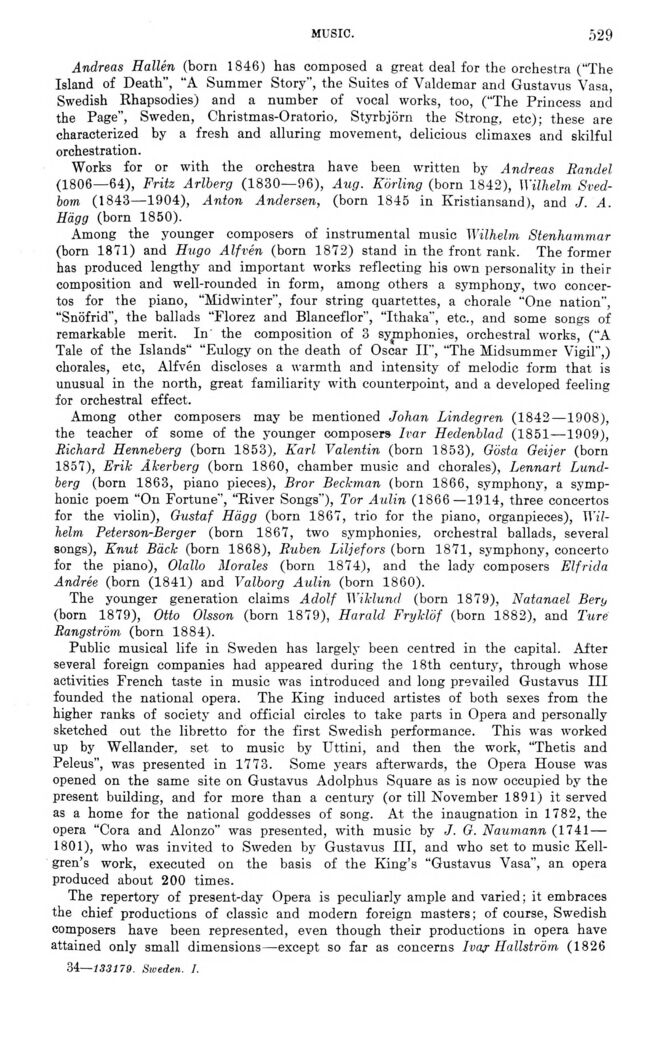
Full resolution (JPEG) - On this page / på denna sida - IV. Education and Mental Culture. Introd. by P. E. Lindström - 10. Fine Arts - Music. By K. Valentin

<< prev. page << föreg. sida << >> nästa sida >> next page >>
Below is the raw OCR text
from the above scanned image.
Do you see an error? Proofread the page now!
Här nedan syns maskintolkade texten från faksimilbilden ovan.
Ser du något fel? Korrekturläs sidan nu!
This page has never been proofread. / Denna sida har aldrig korrekturlästs.
music.
529
Andreas Hallen (born 1846) has composed a great deal for the orchestra ("The
Island of Death", "A Summer Story", the Suites of Valdemar and Gustavus Vasa,
Swedish Rhapsodies) and a number of vocal works, too, ("The Princess and
the Page", Sweden, Christmas-Oratorio, Styrbjörn the Strong, etc); these are
characterized by a fresh and alluring movement, delicious climaxes and skilful
orchestration.
Works for or with the orchestra have been written by Andreas Randel
(1806—64), Fritz Arlberg (1830—96), Aug. Körling (born 1842), Wilhelm
Sved-bom (1843—1904), Anton Andersen, (born 1845 in Kristiansand), and J. A.
Hägg (born 1850).
Among the younger composers of instrumental music Wilhelm Stenhammar
(born 1871) and Hugo Älfven (born 1872) stand in the front rank. The former
has produced lengthy and important works reflecting his own personality in their
composition and well-rounded in form, among others a symphony, two
concertos for the piano, "Midwinter", four string quartettes, a chorale "One nation",
"Snöfrid", the ballads "Florez and Blanceflor", "Ithaka", etc., and some songs of
remarkable merit. In the composition of 3 symphonies, orchestral works, ("A
Tale of the Islands" "Eulogy on the death of Oscar II", "The Midsummer Vigil",)
chorales, etc, Alfvén discloses a warmth and intensity of melodic form that is
unusual in the north, great familiarity with counterpoint, and a developed feeling
for orchestral effect.
Among other composers may be mentioned Johan Lindegren (1842—1908),
the teacher of some of the younger composers Ivar Hedenblad (1851—1909),
Richard Henneberg (born 1853), Karl Valentin (born 1853), Oösta Geijer (born
1857), Erik Åkerberg (born 1860, chamber music and chorales), Lennart
Lundberg (born 1863, piano pieces), Bror Beckman (born 1866, symphony, a
symphonie poem "On Fortune", "River Songs"), Tor Aulin (1866—1914, three concertos
for the violin), Gustaf Hägg (born 1867, trio for the piano, organpieces),
Wilhelm Peterson-Berger (born 1867, two symphonies, orchestral ballads, several
songs), Knut Bäck (born 1868), Ruben Liljefors (born 1871, symphony, concerto
for the piano), Olallo Morales (born 1874), and the lady composers Elfrida
Andree (born (1841) and Valborg Aulin (born 1860).
The younger generation claims Adolf Wiklund (born 1879), Natanael Bery
(born 1879), Otto Olsson (born 1879), Harald Fryklöf (born 1882), and Ture
Rangström (born 1884).
Public musical life in Sweden has largely been centred in the capital. After
several foreign companies had appeared during the 18th century, through whose
activities French taste in music was introduced and long prevailed Gustavus III
founded the national opera. The King induced artistes of both sexes from the
higher ranks of society and official circles to take parts in Opera and personally
sketched out the libretto for the first Swedish performance. This was worked
up by Wellander, set to music by Uttini, and then the work, "Thetis and
Peleus", was presented in 1773. Some years afterwards, the Opera House was
opened on the same site on Gustavus Adolphus Square as is now occupied by the
present building, and for more than a century (or till November 1891) it served
as a home for the national goddesses of song. At the inaugnation in 1782, the
opera "Cora and Alonzo" was presented, with music by J. G. Naumann (1741 —
1801), who was invited to Sweden by Gustavus III, and who set to music
Kell-gren’s work, executed on the basis of the King’s "Gustavus Vasa", an opera
produced about 200 times.
The repertory of present-day Opera is peculiarly ample and varied; it embraces
the chief productions of classic and modem foreign masters; of course, Swedish
composers have been represented, even though their productions in opera have
attained only small dimensions—except so far as concerns Ivaj- Hallström (1826
34—133179. Sweden. I.
<< prev. page << föreg. sida << >> nästa sida >> next page >>